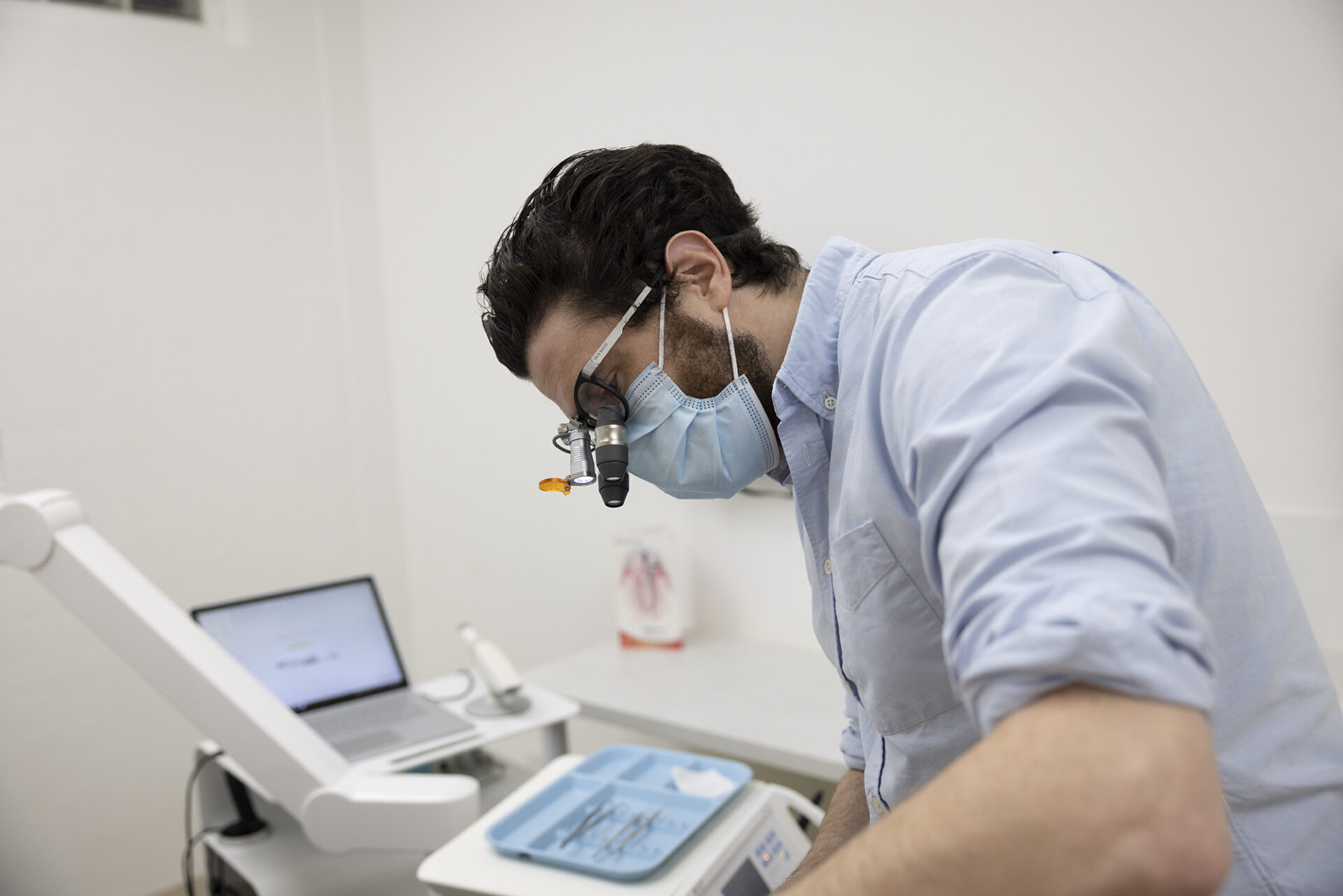Bleeding Gums Treatment

Noticing a bit of pink in the basin when you brush your teeth? A little blood when you spit out your toothpaste is a common sign that your gums might need some attention. While it can be unsettling, understanding the causes and seeking timely bleeding gums treatment is key to restoring your oral health.
Sore, swollen, or bleeding gums aren’t just uncomfortable; they can lead to bad breath (halitosis) and even make you feel a bit self-conscious. It might seem like brushing less will help, but this can actually make the problem worse by allowing more plaque to build up.
We’re Here to Help at Kensington Dental Care
At Kensington Dental Care, your comfort and oral health are our top priorities. If you’re experiencing symptoms of gum disease, our first step is a gentle assessment of your overall mouth hygiene as part of your personalised bleeding gums treatment plan.
As your dedicated dental professionals, we’re here to provide clear information, expert advice, accurate diagnosis, and effective treatment for everything from early gingivitis to more advanced gum concerns. Whether you have questions about receding gums, mouth ulcers, which antibacterial mouthwash is best for gum inflammation, or need advice on tooth decay or other dental needs, please don’t hesitate to contact us to book an appointment today. We believe in creating a supportive environment where you can openly discuss your concerns.
Why Are My Gums Bleeding? Understanding the Common Causes
Bleeding gums are most often a sign that plaque, a sticky film of bacteria, has built up along your gum line. This can irritate your gums, making them red, swollen, and prone to bleeding. This early stage is often gingivitis, a common and reversible form of gum disease.
However, several factors can contribute to or worsen bleeding gums:
- Plaque and Calculus: If plaque isn’t regularly removed, it can harden into calculus (tartar), which is much tougher to get rid of and provides an ideal surface for more plaque to grow. This is a primary cause requiring professional cleaning.
- Brushing Technique: Brushing too hard or using a hard-bristled toothbrush can sometimes irritate sensitive gums.
- New Oral Hygiene Routine: Sometimes, starting a new flossing routine can cause temporary bleeding, which should subside as your gums get healthier.
- Medications: Certain medications, like blood thinners, can make your gums more likely to bleed. It’s important to let us know about any medications you’re taking.
- Nutritional Deficiencies: A lack of certain vitamins, like Vitamin C or K, can sometimes affect gum health.
- Hormonal Changes: Fluctuations in hormones, such as during pregnancy (pregnancy gingivitis) or puberty, can make gums more sensitive and prone to bleeding.
- Underlying Health Conditions: Conditions like diabetes, immune disorders, and cardiovascular disease (which you mention) can also impact gum health.
- Smoking: Smoking significantly increases your risk of gum disease and can hinder healing.
When your gums are aggravated, even gentle brushing can cause bleeding, signalling it’s time for professional attention.
Bad Breath and Bleeding Gums
While professional care is essential for treating underlying gum disease, good home habits can help manage symptoms and prevent further issues. Here are some home remedies for bleeding gums and tips:
- Gentle, Thorough Brushing: Brush twice a day for two minutes with a soft-bristled toothbrush and fluoride toothpaste. Focus on cleaning along the gum line gently.
- Daily Flossing: Floss once a day to remove plaque and food particles from between your teeth where your brush can’t reach. If your gums bleed, be gentle but persistent.
- Warm Salt Water Rinse: Rinsing your mouth with a mild warm salt water solution (half a teaspoon of salt in a cup of warm water) a few times a day can help soothe inflamed gums.
- Consider an Antibacterial Mouthwash: If you’re wondering about the best mouthwash for bleeding gums, we can discuss options suitable for you, such as a therapeutic mouthwash, during your visit. Some can help reduce bacteria and plaque.
- Balanced Diet: Eating a balanced diet rich in vitamins and minerals supports overall oral health.
Remember, these home care tips are supportive measures. If bleeding persists for more than a week or two despite good home care, it’s crucial to see us to determine the cause and get the right treatment.

Understanding Gum Disease: Gingivitis and Periodontitis
“Gum disease” isn’t a single condition. The two most common forms are:
- Gingivitis: This is the early, mild stage of gum disease. Gums may be red, swollen, and bleed easily. Crucially, gingivitis is reversible with professional treatment (like a thorough clean) and improved oral hygiene. There’s usually no permanent bone loss at this stage.
- Periodontitis: If gingivitis isn’t treated, it can progress to periodontitis. This is a more serious condition where the inflammation spreads below the gum line, affecting the tissues and bone that support your teeth. Pockets can form between the teeth and gums, trapping more bacteria. This can lead to gum recession, loose teeth, and eventual tooth loss. Bacteria thriving in these subgingival pockets also significantly contribute to persistent bad breath (halitosis).
Early diagnosis and treatment for bleeding gums and gum disease are vital to prevent progression to periodontitis.
Professional Bleeding Gums Treatment at Kensington Dental Care
Don’t delay seeking a professional solution if you’re experiencing bleeding gums. When you visit Kensington Dental Care, we’ll:
- Discuss Your Concerns: We’ll listen to your symptoms and any contributing factors you’ve noticed.
- Conduct a Thorough Examination: We’ll carefully examine your gums, teeth, and jaw alignment and assess for signs of inflammation, plaque, and calculus buildup. This helps us diagnose the cause of the bleeding, whether it’s gingivitis or more advanced periodontitis.
- Professional Cleaning: For many, a professional dental cleaning (sometimes called scaling and root planing if deeper cleaning is needed) is essential. This removes plaque and calculus from above and below the gum line that regular brushing can’t reach.
- Tailored Treatment Plan: Based on our findings, we’ll create a personalised treatment plan. This might include advice on specific oral hygiene products, techniques, follow-up appointments, or further periodontal care if needed.
- Honest Advice For Prevention: We’ll discuss your home oral care routine. We get it – revealing habits can be an uncomfortable conversation for some people, but our goal is to help every patient achieve optimal oral health. Honesty helps us provide the best advice for preventing bleeding gums in the future.
Long-Term Prevention and Sharing Your Concerns
Preventing bleeding gums is an ongoing commitment to good oral hygiene and regular dental care:
- Consistent Home Care: Stick to brushing twice daily and flossing once daily.
- Regular Dental Visits: Visit us for your regular six-monthly check-ups and cleans. These visits allow us to catch any early signs of gum problems.
- Manage Risk Factors: If you smoke, we can offer support and resources to help you quit. If you have conditions like diabetes, managing them well is also crucial for your gum health.
- Healthy Lifestyle: A balanced diet contributes significantly to your overall and oral health.
Your oral health is connected to your overall wellbeing. If you have any worries at all about bleeding gums, bad breath, or any other dental issue, please share your concerns with us. We’re committed to providing a caring and judgment-free environment.
Share your concerns with us
Other Services
Our services are provided as a preferred partner of Bupa and HCF health funds.
We also accept all other health funds including Department of Veteran Affairs (DVA).





